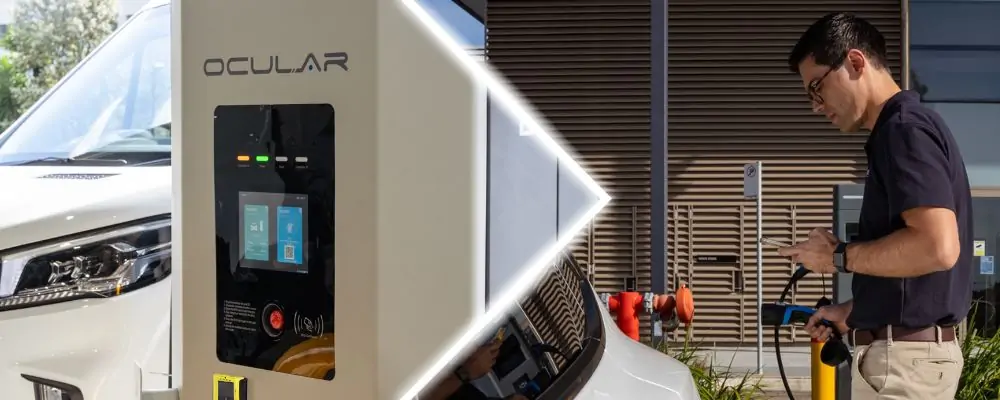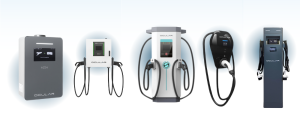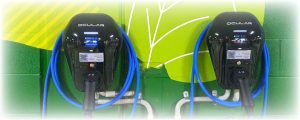How To Make Money With Public EV Charging Stations

Electric vehicle (EV) charging stations give a profitable opportunity for business owners looking to capitalise on the expanding market for environmentally friendly mobility solutions in today’s competitive transportation industry. However, success in this industry demands strategic execution and meticulous planning. This guide covers all the necessary topics, from location selection to future-proofing tactics, to help companies aiming to optimise earnings from EV charging stations. Have any questions about how EVSE can help you with public EV Charging? Click here.
Location:
The location of an EV charging station is crucial to its profitability. High-traffic locations, such as shopping centres, office buildings, and highways, are ideal. When choosing a site, accessibility, closeness to well-known locations, and plenty of parking are essential considerations. It’s crucial to remember that high-visibility regions guarantee regular foot traffic, which raises the station’s usage rate whilst simultaneously drawing in more potential clients. Furthermore, the station’s potential for profitability can be increased by catering to commuters and long-distance travellers by placing it close to major roads or other transportation hubs. Do you need assistance to ensure that the location of your EV chargers is viable? Our feasibility study will address critical electrical and logistical considerations to ensure a sustainable and efficient installation of EV charging at your site.
Market Research:
In order to comprehend the dynamics of EV charging demand in the selected location, thorough market research is essential. Strategic decision-making can be greatly aided by examining the market for EV owners, how they charge, and the competitive environment. To do more thorough market research, it is necessary to predict future trends in addition to understanding present demand. This could involve evaluating laws, subsidies, and rules that deal with EVs and the infrastructure needed to charge them. These considerations have a big impact on the long-term profitability of the station.
Providing Various Charging Levels:
It is essential to provide a range of charging levels to accommodate different EV models and charging needs. Compatibility with a broad range of cars is ensured by installing a range of charging speeds, such as AC and DC charging. Drivers who are short on time tend to be drawn to DC fast chargers because of their quick charging times. To delve deeper into this topic, it’s critical to comprehend the varying charging requirements of electric vehicle users. Some people value speed more than all else, thus they might choose quick charging options over slower, overnight charging options. The station may cater to different preferences by providing multiple charge levels, which in turn maximises its client base and revenue possibilities.

Pricing Strategy:
For revenue optimisation, developing an effective pricing strategy is essential. It’s important to think carefully before charging clients based on the amount of energy used, the time it takes to charge, or a fixed rate. It is important to achieve affordability and profitability in equal measure. Finding the best price points can be aided by researching competitors and understanding consumer willingness to spend. Furthermore, price flexibility can maximise revenue streams and draw in additional clients by providing discounts or tiered pricing plans during off-peak hours. Further, utilising credit card EV chargers will enable the easier flow and payment process of charging one’s EV.
Additional Services:
Adding value-added services to the pricing process improves client satisfaction and encourages loyalty. Providing facilities like WiFi, cozy waiting sections, bathrooms, and close-by stores or cafes improves the entire clientele experience. Considering how competitive the market is, the charging station can differentiate itself from the competition by offering great customer service and a warm atmosphere. Additionally, providing services that address the requirements of EV owners—like information or help with EV charging—can boost client satisfaction and promote return business.
Partnerships and Sponsorships:
Establishing strategic alliances with nearby enterprises, electric vehicle manufactures, or energy providers will present profitable options for both parties. Joint ventures, such as sponsorship agreements or cross-promotional initiatives, increase brand awareness and draw in a larger consumer base. When expanding relationships, it’s critical to find possible areas of overlap with related companies or groups. For example, collaborating with EV manufacturers may result in joint marketing initiatives or grant clients access to special pricing. Similarly, working with energy businesses might open doors to funding for charging infrastructure or offer insights into renewable energy choices.
Advertising and Branding:
Using strong branding and advertising techniques is essential to attracting attention and increasing foot traffic to the charging station. Using online marketing channels, putting up eye-catching signage, and taking part in events centred around electric vehicles strengthen brand awareness and encourage user interaction. You may want to consider investing in an Ocular IQ Advertising Kiosk, enabling you to promote your companies sustainability goals with ease. Beyond conventional advertising techniques, a larger audience, including EV enthusiasts and potential buyers, can be reached by utilising digital marketing tools like social media platforms and targeted web adverts. Furthermore, proactively participating in local community events or sponsorships can raise brand awareness and promote goodwill.

Upkeep and Maintenance:
Careful maintenance and upkeep are required to guarantee the charging station’s flawless performance and safety compliance. Investing in routine maintenance, repairs, and upgrades protects operational effectiveness and reduces the likelihood of downtime. By educating people about maintenance procedures, putting preventative maintenance plans into place, and regularly inspecting charging equipment, service interruptions can be minimised by spotting possible problems early on.
Integration with Renewable Energy:
Using renewable energy sources, such as wind or solar power, lowers operating costs and satisfies customer desires for environmental consciousness. A dedication to sustainability and eco-friendliness is demonstrated by the charging station’s integration of sustainable practices. It’s critical to assess the viability of renewable energy sources considering location, available space, and regulatory issues before delving deeper into the integration of renewable energy. Even if the initial investment may cost more, there will be long-term benefits like lower operating costs and a lesser carbon impact that will balance it out. Take a look at EVSE’s IQ Solar charger that can charge vehicles through excess solar production.
Government Incentives:
For EV charging infrastructure to be as profitable as possible, it is essential to stay up to date on government incentives and subsidies. By utilising existing programs, the charging station’s financial sustainability can be strengthened, and the initial investment burden reduced. It is critical to investigate several federal, state, and local initiatives meant to encourage the adoption of electric vehicles and the construction of infrastructure. This could involve installing charging stations or implementing renewable energy solutions in exchange for tax credits, incentives, or rebates. Participating actively in industry associations or advocacy campaigns can also give you access to important information and networking opportunities regarding government policies. Stay up to date on the most recent government incentives here.

Future-Proofing:
To ensure the charging station is future-proof, it is imperative to anticipate and adjust to new developments in technology and market trends. Putting money on flexible infrastructure that can take advantage of innovations like vehicle-to-grid (V2G) technology can keep you competitive and relevant in a market that is changing quickly. Before delving deeper into future-proofing tactics, it’s critical to keep up with the legal and technological developments influencing the EV charging sector. Investing in scalable infrastructure solutions that can adapt to changing customer preferences or standards may be necessary to achieve this. Furthermore, cultivating an innovative and ongoing learning culture within the company helps promote adaptability and preparedness for upcoming changes.
Through careful implementation of these tactics, businesses will maximise revenue generated by EV charging stations and simultaneously facilitate the expansion of environmentally friendly transportation options. Success in this emerging industry is largely dependent on embracing innovation, developing strategic alliances, and placing a high value on customer-centricity. As the world moves more and more toward electrified transportation, EV charging stations present a profitable opportunity for enterprising individuals.
Have any questions? Contact us:
Phone: 0800 990 032
Email: sales@evse.nz


